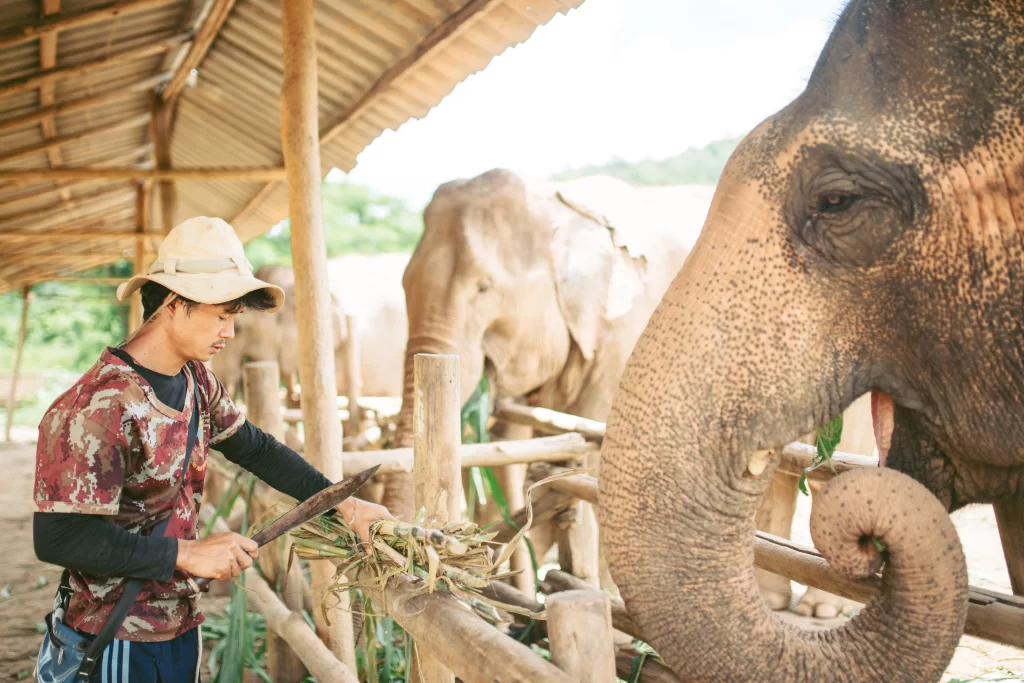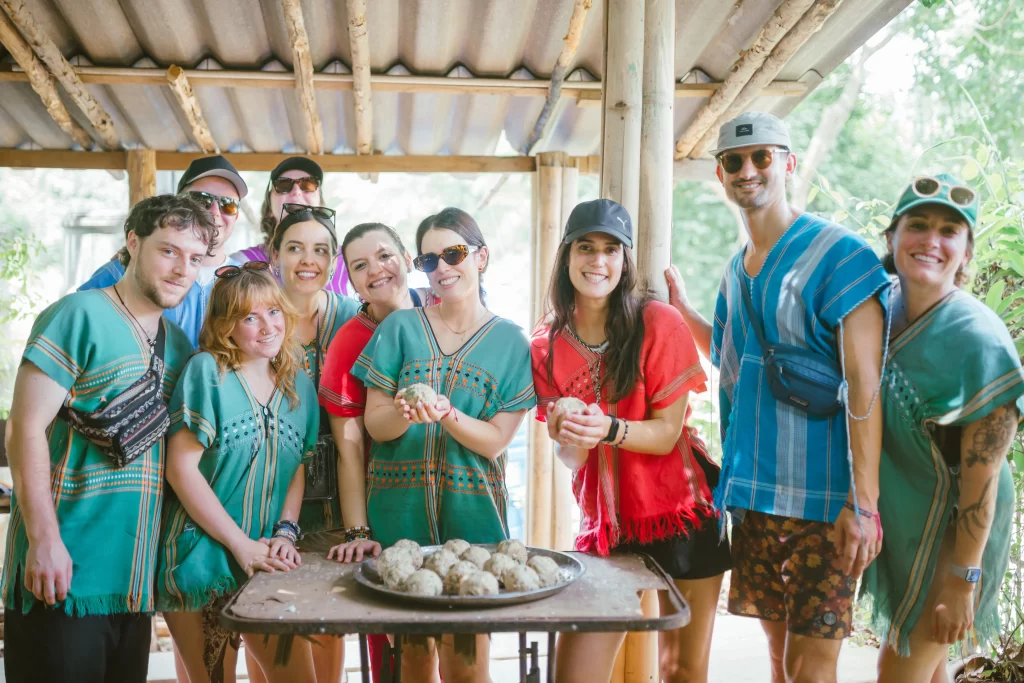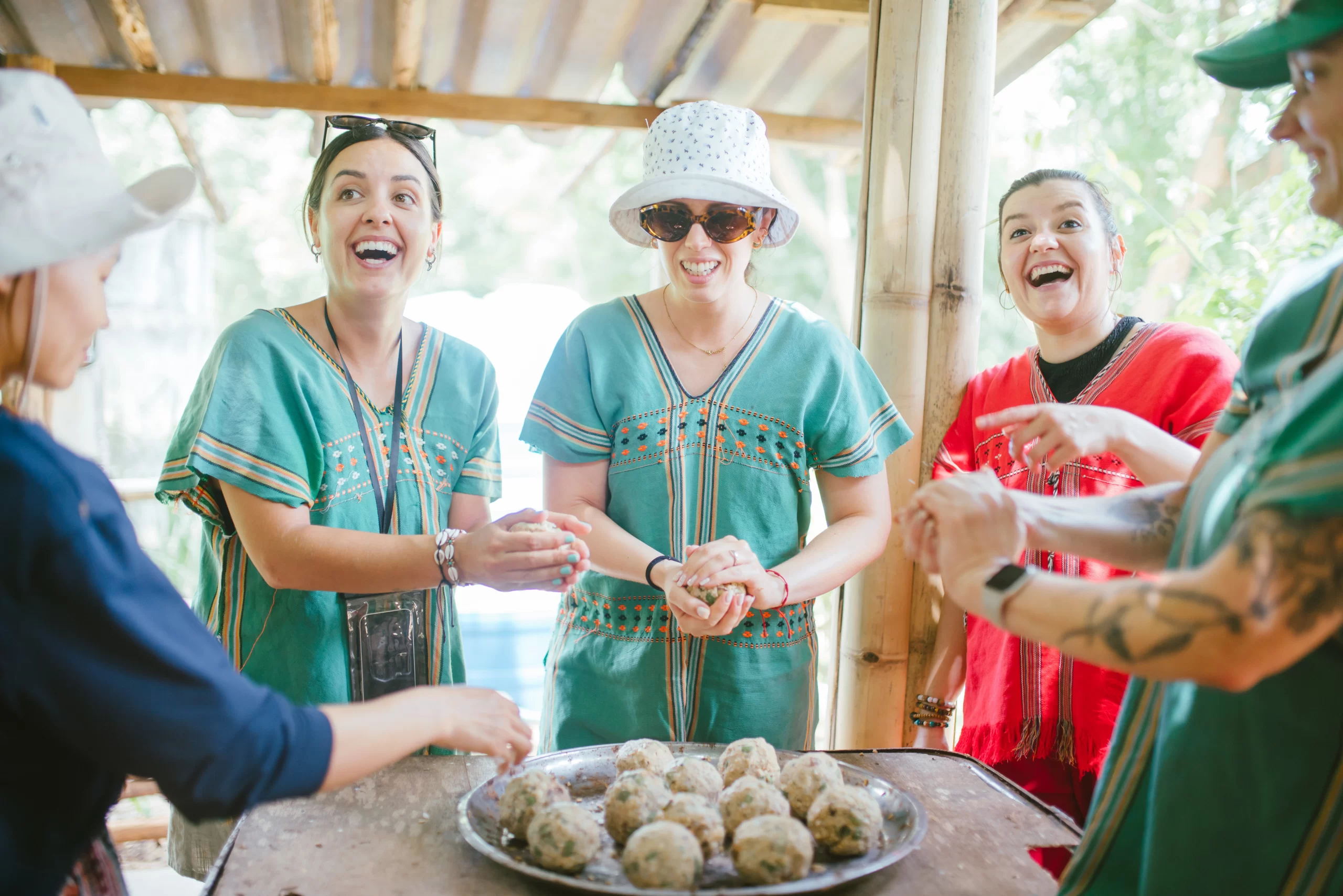Elephant Feeding Experience Chiang Mai- A Mahout’s Journey
Elephant Retreat, located just one hour outside of Chiang Mai City, offers an immersive experience of the world of the Mahout and its close relationship with the elephants. While many sanctuaries allow direct contact with elephants, at Elephant Retreat, we provide a unique, ethical, and educational approach. Guests will not physically interact with the elephants; instead, they will observe and learn from the Mahouts as they do their daily routines caring for these majestic animals. One of the highlights of the experience is watching the elephants being fed, a fascinating process that provides insight into the incredible bond between Mahouts and elephants, as well as the sheer magnitude of the elephants’ dietary needs.
The Role of the Mahout in Elephant Care
The Mahout plays a crucial role in the daily care of elephants, forming a bond built on trust, respect, and an understanding of the elephant’s needs. Feeding time is one of the most essential aspects of elephant care. At Elephant Retreat, you will get an up-close look at how Mahouts carefully prepare and feed their elephants, ensuring they remain healthy and strong.
During this process, the Mahout demonstrates skill and patience, as elephants require a tremendous amount of food daily to stay healthy and active. Observing the feeding process is a way to learn about elephant nutrition and witness the depth of the Mahout-elephant relationship, a bond cultivated over years of care and companionship.

How Much Food Do Elephants Eat?
One of the most common questions about elephants is, “How much food does an elephant eat daily?” Elephants are the largest land animals on Earth, and their diet is as impressive as their size. An adult elephant consumes between 150 and 300 kilograms (330 to 660 pounds) of food daily. Their diet mainly consists of grass, fruits, vegetables, bark, and leaves, making them herbivores. Because their digestive system is inefficient, they eat 12-18 hours daily.
At Elephant Retreat, guests can observe the Mahouts preparing the food and feeding the elephants throughout the day. Watching the process of gathering and preparing hundreds of kilograms of food will give visitors a deeper appreciation of the effort required to care for such massive animals.
What Do Elephants Eat?
Elephants have a diverse diet depending on the season, environment, and nutritional needs. At Elephant Retreat, our elephants’ diet is designed to closely resemble what they would eat in the wild. The Mahouts prepare a variety of food, which often includes:
- Grass and Hay: These are staple foods that make up the majority of an elephant’s diet.
- Fruits and Vegetables: Elephants love a variety of fresh produce, including bananas, sugarcane, melons, and pumpkins.
- Bark and Leaves: Elephants consume tree bark and leaves as sources of fiber.
- Supplements: Mahouts also prepare special supplements to ensure the elephants get the necessary vitamins and minerals. At Elephant Retreat, guests can observe the Mahouts preparing the supplements, including rice, tamarind, and a mix of natural ingredients. Guests are invited to join in with the Mahout.
This variety keeps the elephants healthy and engaged as they enjoy the different textures and flavors of their meals.
The Feeding Process at Elephant Retreat
At Elephant Retreat, feeding time is always a welcomed activity by the elephants. The guests help the Mahouts prepare the food, chopping fruits, gathering leaves, and ensuring that everything is ready for the elephants. When the elephants approach the feeding area, guests can observe the excitement and anticipation in these gentle giants as they are fed by their Mahouts. While elephants can eat large amounts in one sitting, the Mahouts feed them in several stages daily to ensure they receive proper nutrition and digestion.
Feeding time also strengthens the bond between the Mahout and the elephant. The Mahouts continue to build trust and mutual respect by providing food and care. Your guide will explain the nature of the relationship between the Mahout and the elephant, offering insights into how the Mahouts read the behavior and needs of their elephants.


A No-Touch Policies, Understanding the Ethics
At Elephant Retreat, we believe in protecting the well-being of our elephants by not allowing direct interaction between guests and the animals. Although touching or riding elephants is a common feature at other attractions, we are committed to providing an ethical alternative that respects the natural behaviors and needs of the elephants. By observing from a safe distance, guests will gain a deeper appreciation for elephants’ natural behaviors and the effort that goes into their care, all while promoting responsible tourism practices.
Enhancing Your Experience with Education and Entertainment
Our goal at Elephant Retreat is to provide a visually captivating experience and educate guests on the complexities of elephant care. Like all other activities at the sanctuary, the feeding process is designed to be informative and entertaining. Guests will learn about elephant nutrition, the challenges of feeding such large animals, and the vital role that Mahouts play in the elephants’ well-being.
As you watch the Mahouts feed the elephants, your guide will share interesting facts and stories about the animals, providing context to the actions you’re observing. Whether it’s explaining how elephants use their trunks to delicately pick up food or discussing the cultural significance of elephants in Thailand, this experience will leave you with a lasting impression.
A Rewarding and Ethical Experience
Join us at Elephant Retreat in supporting an ethical and sustainable approach to elephant tourism. We take pride in ensuring our elephants live happy, healthy lives, free from stress and unnecessary human contact. Our no-touch policy aligns with our mission to promote responsible tourism while allowing guests to witness these majestic creatures.
Join us at Elephant Retreat for an unforgettable experience. You’ll leave not only entertained but also enlightened about the relationship between the Mahout and elephant.



